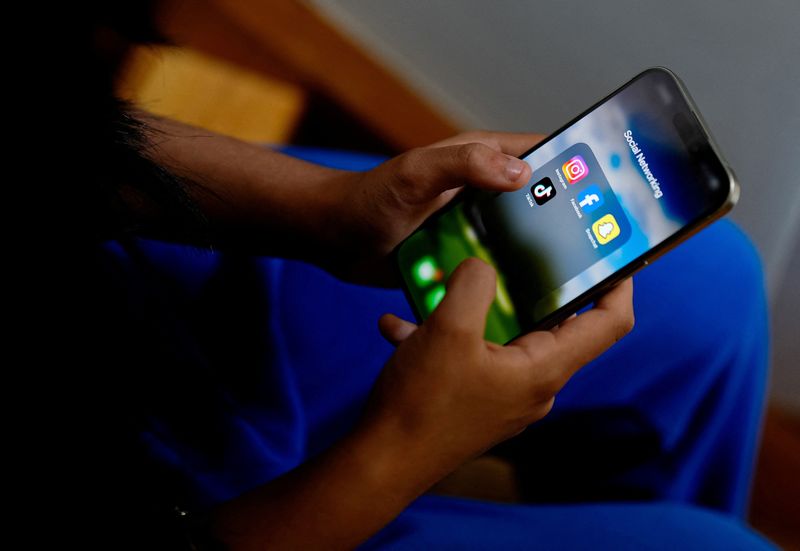By Byron Kaye
SYDNEY (Reuters) - Since Meta whistleblower Frances (BCBA:BBARm) Haugen aired internal emails in 2021 showing the tech giant knew of social media's mental health impacts on teenagers, world leaders have agonised over how to curb the technology's addictive pull on young minds.
Even a 2023 recommendation by the U.S. surgeon general to put health warnings on social media, blaming it for what he called a teenage mental health crisis, could not help lawmakers from Florida to France navigate resistance on grounds of free speech, privacy and the limits of age-checking technology.
The spark that ended the stalemate was when the wife of the leader of Australia's second-smallest state read The Anxious Generation, a 2024 bestseller criticising social media by U.S. social psychologist Jonathan Haidt, and told her husband to take action.
"I remember precisely the moment that she said to me 'you've got to read this book and you've got to do something about it'," South Australia Premier Peter Malinauskas told reporters in Adelaide on Friday, a day after the country's federal parliament passed a nationwide social media ban for youths under 16.
"I didn't reasonably anticipate it would take on so quickly," he added.
Malinauskas's personal quest to restrict youth access to social media in his state, which represents just 7% of Australia's 27 million population, to the world's first national ban took just six months.
The speed underscores the depth of concern in the Australian electorate over the issue. Australian Prime Minister Anthony Albanese is due to hold an election in early 2025.
An Australian government YouGov survey found that 77% of Australians back the under-16 social media ban, up from 61% in August prior to the government's official announcement. Only 23% oppose the measure.
"It all originated here," said Rodrigo Praino, a professor of politics and public policy at South Australia's Flinders University.
"The federal government including the prime minister understood immediately that that was a problem that needed to be solved (and) best addressed if it's done nationwide. Allowing kids to indiscriminately use social media has become an issue globally."
FAST MOVING
When the father of four answered the call from his wife in May, Facebook (NASDAQ:META) and Instagram owner Meta had two months earlier said it would stop paying content royalties to news outlets globally, potentially triggering an Australian online copyright law.
Meta's decision, in part, prompted the federal government to open a broad inquiry into societal impacts of social media, ranging from the merits of age-gating social media to the knock-on effects of Meta cancelling royalties.
Opposition lawmakers meanwhile began calling for age restrictions on social media against the backdrop of a legal fight between X and Australia's e-Safety regulator over the spread of false and graphic content related to two public knife attacks in Sydney in April.
In May, Rupert Murdoch's News Corp (NASDAQ:NWSA), the country's biggest newspaper publisher, began an editorial campaign to ban children under 16 from social media, calling "Let Them Be Kids".
Through the middle of 2024, News Corp mastheads and the parliamentary inquiry aired emotional accounts from parents whose children had taken or lost their lives as a result of bullying and body image problems tied to social media.
After Malinauskas unveiled his state policy banning under-14s in September, Albanese was in the media the next day saying his government would enact a federal version by the end of the year.
"Parents want their kids off their phones and on the footy field," said Albanese, who like Malinauskas is from the centre-left Labor party. "So do I."
The proposed South Australian ban was, however, largely in line with restrictions already legislated in countries including France and U.S. states like Florida, which held the door open for teens over 14 to keep using social media with parental permission.
The federal model Albanese's government introduced to parliament in November carried no parental discretion, with the explanation that it freed parents from the burden of playing a policing role.
The ban was roundly attacked by social media companies which complained it gave them full responsibility - and the threat of a A$49.5 million fine - without telling them how it would work. A trial of age-verification technology begins next year.
A spokesperson for TikTok, which is hugely popular with teen users, said on Friday the process had been rushed and risked
pushing young people to "darker corners of the internet".
The left-leaning Greens rejected the law as rushed and unfair on young people, while some far-right lawmakers broke from their party's support and voted against it on concerns of government overreach and potential surveillance.
But with locked-in support from the government and most of the opposition, the law was passed just after 11pm on the last parliamentary day of the year. It takes effect one year later.
"I'm pleased to see that it's got as far as it has in Australia," said Robert French, the former High Court judge commissioned by Malinauskas in May to report on whether a state-based age restriction would be possible.

Some of French's recommendations, including making the ban national and putting responsibility on platforms to take reasonable steps to keep minors out, are included in the final legislation.
"The basic sensible model is in place," French said by telephone.